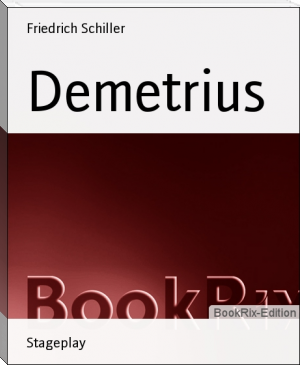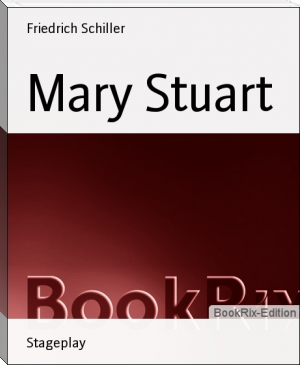The Robbers - Friedrich Schiller (the first e reader TXT) 📗

- Author: Friedrich Schiller
Book online «The Robbers - Friedrich Schiller (the first e reader TXT) 📗». Author Friedrich Schiller
Bohemia, to have been at the battle of Prague along with my brother - to have seen him breathe his last on the field of battle!
HERMANN. Will he believe me?
FRANCIS. Ho! ho! let that be my care! Take this packet. There you will find your commission set forth at large; and documents, to boot, which shall convince the most incredulous. Only make haste to get away unobserved. Slip through the back gate into the yard, and then scale the garden wall. - The denouement of this tragicomedy you may leave to me!
HERMANN. That, I suppose, will be, "Long live our new baron, Francis von Moor!"
FRANCIS (patting his cheeks). How cunning you are! By this means, you see, we attain all our aims at once and quickly. Amelia relinquishes all hope of him, - the old man reproaches himself for the death of his son, and - he sickens - a tottering edifice needs no earthquake to bring it down - he will not survive the intelligence - then am I his only son,
- Amelia loses every support, and becomes the plaything of my will, and you may easily guess - in short, all will go as we wish - but you must not flinch from your word.
HERMANN. What do you say? (Exultingly.) Sooner shall the ball turn back in its course, and bury itself in the entrails of the marksman. Depend upon me! Only let me to the work. Adieu!
FRANCIS (calling after him). The harvest is thine, dear Hermann! (Alone.) When the ox has drawn the corn into the barn, he must put up with hay. A dairy maid for thee, and no Amelia!
SCENE II. - Old Moor's Bedchamber.
OLD MOOR asleep in an arm-chair; AMELIA.
AMELIA (approaching him on tip-toe). Softly! Softly! He slumbers. (She places herself before him.) How beautiful! how venerable! - venerable as the picture of a saint. No, I cannot be angry with thee, thou head with the silver locks; I cannot be angry with thee! Slumber on gently, wake up cheerfully - I alone will be the sufferer.
OLD M. (dreaming). My son! my son! my son!
AMELIA (seizes his hand). Hark! - hark! his son is in his dreams.
OLD M. Are you there? Are you really there! Alas! how miserable you seem! Fix not on me that mournful look! I am wretched enough.
AMELIA (awakens him abruptly). Look up, dear old man! 'Twas but a dream. Collect yourself!
OLD M. (half awake). Was he not there? Did I not press his hands? Cruel Francis! wilt thou tear him even from my dreams?
AMELIA (aside). Ha! mark that, Amelia!
OLD M. (rousing himself). Where is he? Where? Where am I? You here, Amelia?
AMELIA. How do you find yourself? You have had a refreshing slumber.
OLD M. I was dreaming about my son. Why did I not dream on? Perhaps I might have obtained forgiveness from his lips.
AMELIA. Angels bear no resentment - he forgives you. (Seizes his hand sorrowfully.) Father of my Charles! I, too, forgive you.
OLD M. No, no, my child! That death-like paleness of thy cheek is the father's condemnation. Poor girl! I have robbed thee of the happiness of thy youth. Oh, do not curse me!
AMELIA (affectionately kissing his hand). I curse you?
OLD M. Dost thou know this portrait, my daughter?
AMELIA. Charles!
OLD M. Such was he in his sixteenth year. But now, alas! how changed. Oh, it is raging within me. That gentleness is now indignation; that smile despair. It was his birthday, was it not, Amelia - in the jessamine bower - when you drew this picture of him? Oh, my daughter! How happy was I in your loves.
AMELIA (with her eye still riveted upon the picture). No, no, it is not he! By Heaven, that is not Charles! Here (pointing to her head and her heart), here he is perfect; and how different. The feeble pencil avails not to express that heavenly spirit which reigned in his fiery eye. Away with it! This is a poor image, an ordinary man! I was a mere dauber.
OLD M. That kind, that cheering look! Had that been at my bedside, I should have lived in the midst of death. Never, never should I have died!
AMELIA. No, you would never, never have died. It would have been but a leap, as we leap from one thought to another and a better. That look would have lighted you across the tomb - that look would have lifted you beyond the stars!
OLD M. It is hard! it is sad! I am dying, and my son Charles is not here - I am borne to my tomb, and he weeps not over my grave. How sweet it is to be lulled into the sleep of death by a son's prayer - that is the true requiem.
AMELIA (with enthusiasm). Yes, sweet it is, heavenly sweet, to be lulled into the sleep of death by the song of the beloved. Perhaps our dreams continue in the grave - a long, eternal, never-ending dream of Charles - till the trumpet of resurrection sounds - (rising in ecstasy)
- and thenceforth and forever in his arms! (A pause; she goes to the piano and plays.)
ANDROMACHE.
Oh, Hector, wilt thou go for evermore,
When fierce Achilles, on the blood-stained shore,
Heaps countless victims o'er Patroclus' grave?
When then thy hapless orphan boy will rear,
Teach him to praise the gods and hurl the spear,
When thou art swallow'd up in Xanthus' wave?
OLD M. A beautiful song, my daughter. You must play that to me before I die.
AMELIA. It is the parting of Hector and Andromache. Charles and I used often to sing it together to the guitar. (She continues.)
HECTOR.
Beloved wife! stern duty calls to arms -
Go, fetch my lance! and cease those vain alarms!
On me is cast the destiny of Troy!
Astyanax, my child, the Gods will shield,
Should Hector fall upon the battle-field;
And in Elysium we shall meet with joy!
Enter DANIEL.
DANIEL. There is a man without, who craves to be admitted to your presence, and says he brings tidings of importance.
OLD M. To me there is but one thing in this world of importance; thou knowest it, Amelia. Perhaps it is some unfortunate creature who seeks assistance? He shall not go hence in sorrow.
AMELIA. - If it is a beggar, let him come up quickly.
OLD M. Amelia, Amelia! spare me!
AMELIA (continues to play and sing.)
ANDROMACHE.
Thy martial tread no more will grace my hall -
Thine arms shall hang sad relics on the wall -
And Priam's race of godlike heroes fade!
Oh, thou wilt go where Phoebus sheds no light -
Where black Cocytus wails in endless night
Thy love will die in Lethe's gloomy shade.
HECTOR.
Though I in Lethe's darksome wave should sink,
And cease on other mortal ties to think,
Yet thy true love shall never be forgot!
Hark! on the walls I hear the battle roar -
Gird on my armor - and, oh, weep no more.
Thy Hector's love in Lethe dieth not!
(Enter FRANCIS, HERMANN in disguise, DANIEL.)
FRANCIS. Here is the man. He says that he brings terrible news. Can you bear the recital!
OLD M. I know but one thing terrible to hear. Come hither, friend, and spare me not! Hand him a cup of wine!
HERMANN (in a feigned voice). Most gracious Sir? Let not a poor man be visited with your displeasure, if against his will he lacerates your heart. I am a stranger in these parts, but I know you well; you are the father of Charles von Moor.
OLD M. How know you that?
HERMANN. I knew your son
AMELIA (starting up). He lives then? He lives! You know him? Where is he? Where? (About to rush out.)
OLD M. What know you about my son?
HERMANN. He was a student at the university of Leipzic. From thence he travelled about, I know not how far. He wandered all over Germany, and, as he told me himself, barefoot and bareheaded, begging his bread from door to door. After five months, the fatal war between Prussia and Austria broke out afresh, and as he had no hopes left in this world, the fame of Frederick's victorious banner drew him to Bohemia. Permit me, said he to the great Schwerin, to die on the bed of heroes, for I have no longer a father! -
OLD M. O! Amelia! Look not on me!
HERMANN. They gave him a pair of colors. With the Prussians he flew on the wings of victory. We chanced to lie together, in the same tent. He talked much of his old father, and of happy days that were past - and of disappointed hopes - it brought the tears into our eyes.
OLD M. (buries his face in his pillow). - No more! Oh, no more!
HERMANN. A week after, the fierce battle of Prague was fought - I can assure you your son behaved like a brave soldier. He performed prodigies that day in sight of the whole army. Five regiments were successively cut down by his side, and still he kept his ground. Fiery shells fell right and left, and still your son kept his ground. A ball shattered his right hand: he seized the colors with his left, and still he kept his ground!
AMELIA (in transport). Hector, Hector! do you hear? He kept his ground!
HERMANN. On the evening of the battle I found him on the same spot. He had sunk down, amidst a shower of hissing balls: with his left hand he was staunching the blood that flowed from a fearful wound;
HERMANN. Will he believe me?
FRANCIS. Ho! ho! let that be my care! Take this packet. There you will find your commission set forth at large; and documents, to boot, which shall convince the most incredulous. Only make haste to get away unobserved. Slip through the back gate into the yard, and then scale the garden wall. - The denouement of this tragicomedy you may leave to me!
HERMANN. That, I suppose, will be, "Long live our new baron, Francis von Moor!"
FRANCIS (patting his cheeks). How cunning you are! By this means, you see, we attain all our aims at once and quickly. Amelia relinquishes all hope of him, - the old man reproaches himself for the death of his son, and - he sickens - a tottering edifice needs no earthquake to bring it down - he will not survive the intelligence - then am I his only son,
- Amelia loses every support, and becomes the plaything of my will, and you may easily guess - in short, all will go as we wish - but you must not flinch from your word.
HERMANN. What do you say? (Exultingly.) Sooner shall the ball turn back in its course, and bury itself in the entrails of the marksman. Depend upon me! Only let me to the work. Adieu!
FRANCIS (calling after him). The harvest is thine, dear Hermann! (Alone.) When the ox has drawn the corn into the barn, he must put up with hay. A dairy maid for thee, and no Amelia!
SCENE II. - Old Moor's Bedchamber.
OLD MOOR asleep in an arm-chair; AMELIA.
AMELIA (approaching him on tip-toe). Softly! Softly! He slumbers. (She places herself before him.) How beautiful! how venerable! - venerable as the picture of a saint. No, I cannot be angry with thee, thou head with the silver locks; I cannot be angry with thee! Slumber on gently, wake up cheerfully - I alone will be the sufferer.
OLD M. (dreaming). My son! my son! my son!
AMELIA (seizes his hand). Hark! - hark! his son is in his dreams.
OLD M. Are you there? Are you really there! Alas! how miserable you seem! Fix not on me that mournful look! I am wretched enough.
AMELIA (awakens him abruptly). Look up, dear old man! 'Twas but a dream. Collect yourself!
OLD M. (half awake). Was he not there? Did I not press his hands? Cruel Francis! wilt thou tear him even from my dreams?
AMELIA (aside). Ha! mark that, Amelia!
OLD M. (rousing himself). Where is he? Where? Where am I? You here, Amelia?
AMELIA. How do you find yourself? You have had a refreshing slumber.
OLD M. I was dreaming about my son. Why did I not dream on? Perhaps I might have obtained forgiveness from his lips.
AMELIA. Angels bear no resentment - he forgives you. (Seizes his hand sorrowfully.) Father of my Charles! I, too, forgive you.
OLD M. No, no, my child! That death-like paleness of thy cheek is the father's condemnation. Poor girl! I have robbed thee of the happiness of thy youth. Oh, do not curse me!
AMELIA (affectionately kissing his hand). I curse you?
OLD M. Dost thou know this portrait, my daughter?
AMELIA. Charles!
OLD M. Such was he in his sixteenth year. But now, alas! how changed. Oh, it is raging within me. That gentleness is now indignation; that smile despair. It was his birthday, was it not, Amelia - in the jessamine bower - when you drew this picture of him? Oh, my daughter! How happy was I in your loves.
AMELIA (with her eye still riveted upon the picture). No, no, it is not he! By Heaven, that is not Charles! Here (pointing to her head and her heart), here he is perfect; and how different. The feeble pencil avails not to express that heavenly spirit which reigned in his fiery eye. Away with it! This is a poor image, an ordinary man! I was a mere dauber.
OLD M. That kind, that cheering look! Had that been at my bedside, I should have lived in the midst of death. Never, never should I have died!
AMELIA. No, you would never, never have died. It would have been but a leap, as we leap from one thought to another and a better. That look would have lighted you across the tomb - that look would have lifted you beyond the stars!
OLD M. It is hard! it is sad! I am dying, and my son Charles is not here - I am borne to my tomb, and he weeps not over my grave. How sweet it is to be lulled into the sleep of death by a son's prayer - that is the true requiem.
AMELIA (with enthusiasm). Yes, sweet it is, heavenly sweet, to be lulled into the sleep of death by the song of the beloved. Perhaps our dreams continue in the grave - a long, eternal, never-ending dream of Charles - till the trumpet of resurrection sounds - (rising in ecstasy)
- and thenceforth and forever in his arms! (A pause; she goes to the piano and plays.)
ANDROMACHE.
Oh, Hector, wilt thou go for evermore,
When fierce Achilles, on the blood-stained shore,
Heaps countless victims o'er Patroclus' grave?
When then thy hapless orphan boy will rear,
Teach him to praise the gods and hurl the spear,
When thou art swallow'd up in Xanthus' wave?
OLD M. A beautiful song, my daughter. You must play that to me before I die.
AMELIA. It is the parting of Hector and Andromache. Charles and I used often to sing it together to the guitar. (She continues.)
HECTOR.
Beloved wife! stern duty calls to arms -
Go, fetch my lance! and cease those vain alarms!
On me is cast the destiny of Troy!
Astyanax, my child, the Gods will shield,
Should Hector fall upon the battle-field;
And in Elysium we shall meet with joy!
Enter DANIEL.
DANIEL. There is a man without, who craves to be admitted to your presence, and says he brings tidings of importance.
OLD M. To me there is but one thing in this world of importance; thou knowest it, Amelia. Perhaps it is some unfortunate creature who seeks assistance? He shall not go hence in sorrow.
AMELIA. - If it is a beggar, let him come up quickly.
OLD M. Amelia, Amelia! spare me!
AMELIA (continues to play and sing.)
ANDROMACHE.
Thy martial tread no more will grace my hall -
Thine arms shall hang sad relics on the wall -
And Priam's race of godlike heroes fade!
Oh, thou wilt go where Phoebus sheds no light -
Where black Cocytus wails in endless night
Thy love will die in Lethe's gloomy shade.
HECTOR.
Though I in Lethe's darksome wave should sink,
And cease on other mortal ties to think,
Yet thy true love shall never be forgot!
Hark! on the walls I hear the battle roar -
Gird on my armor - and, oh, weep no more.
Thy Hector's love in Lethe dieth not!
(Enter FRANCIS, HERMANN in disguise, DANIEL.)
FRANCIS. Here is the man. He says that he brings terrible news. Can you bear the recital!
OLD M. I know but one thing terrible to hear. Come hither, friend, and spare me not! Hand him a cup of wine!
HERMANN (in a feigned voice). Most gracious Sir? Let not a poor man be visited with your displeasure, if against his will he lacerates your heart. I am a stranger in these parts, but I know you well; you are the father of Charles von Moor.
OLD M. How know you that?
HERMANN. I knew your son
AMELIA (starting up). He lives then? He lives! You know him? Where is he? Where? (About to rush out.)
OLD M. What know you about my son?
HERMANN. He was a student at the university of Leipzic. From thence he travelled about, I know not how far. He wandered all over Germany, and, as he told me himself, barefoot and bareheaded, begging his bread from door to door. After five months, the fatal war between Prussia and Austria broke out afresh, and as he had no hopes left in this world, the fame of Frederick's victorious banner drew him to Bohemia. Permit me, said he to the great Schwerin, to die on the bed of heroes, for I have no longer a father! -
OLD M. O! Amelia! Look not on me!
HERMANN. They gave him a pair of colors. With the Prussians he flew on the wings of victory. We chanced to lie together, in the same tent. He talked much of his old father, and of happy days that were past - and of disappointed hopes - it brought the tears into our eyes.
OLD M. (buries his face in his pillow). - No more! Oh, no more!
HERMANN. A week after, the fierce battle of Prague was fought - I can assure you your son behaved like a brave soldier. He performed prodigies that day in sight of the whole army. Five regiments were successively cut down by his side, and still he kept his ground. Fiery shells fell right and left, and still your son kept his ground. A ball shattered his right hand: he seized the colors with his left, and still he kept his ground!
AMELIA (in transport). Hector, Hector! do you hear? He kept his ground!
HERMANN. On the evening of the battle I found him on the same spot. He had sunk down, amidst a shower of hissing balls: with his left hand he was staunching the blood that flowed from a fearful wound;
Free e-book «The Robbers - Friedrich Schiller (the first e reader TXT) 📗» - read online now
Similar e-books:





Comments (0)